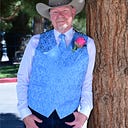Things I Have Always Wanted To Say About Mormonism
Being Silent is Not Only The Norm, But It is Also Required
A well-known English footballer revealed he had a black book many years ago. Inside his black book was a list of names. Names of other footballers who, in his opinion, had it coming to them. In other words, he would return the harsh treatment he had received at their hands, well, feet.
As a thirty-five-year member of the Church of Jesus Christ of Latter-Day Saints, more commonly known as the Mormons, I came across many people who wished they could have shared some of their irritations or concerns. Of course, they, like me, did not do so because of the potential repercussions that would come their way.
Today I open my ‘little black book’ to share just one item I wrote inside over many years. Although sometimes humorous, most items are the harsh realities of being a cult member that portrays itself as a mainstream American and worldwide church. Today points out the challenge of losing your job, pay, career, church membership, family, and friends if you are honest and tell the truth.
I’m a professionally trained historian and researcher. I taught classes at Brigham Young University for a time. Should that be an issue? One prominent church leader, Elder Boyd K. Packer, stated, according to historian D. Michael Quinn, “I have a hard time with historians because they idolize the truth.” Packer continued, “The truth is not uplifting; it destroys. . . . Historians should only tell that part of the truth that is inspiring and uplifting.” My mentor, Ronald W. Walker, a faithful church member, taught me always to seek out the truth no matter what.
As a researcher for the Joseph Fielding Smith Institute at BYU, I eventually had a nervous breakdown and became very sick due to the overwhelming academic constraints I experienced. As the “best and most pedantic researcher since D. Michael Quinn,” according to Dr. Walker, I was then persona non grata when my research did not reach the conclusions the department and church required.
I had a similar experience working for the church welfare department years later. I was the best at my position, and then suddenly, I was dropped like a lead balloon due to my charge of harassment in the workplace and accompanying severe anxiety due to such abuse. You would expect a church to be a caring employee, but not so. The truth is, and always has been, that the organization and the church's name are much more important than one individual. Unlike the bible, which reminds us to seek out the one and care for it, the Mormon church has a paranoid history and is always led by paranoid white, very old men.
A Mormon church leader similarly describes the loss of a few faithful members in the same way Elder Gordon B. Hinckley did,
“If a few people lose their testimonies over this, so be it; it’s better than letting the true facts be known, and dealing with the probable wider negative consequences to the mission of the church.” — see Dialogue: A Journal of Mormon Thought (Fall 1998)
In other words, the church's position in mainstream America and its image is much more important than honesty and caring for its members. Because lying to the majority and silencing the minority is typical of a totalitarian regime, not a church.
© Stephen G. Arrowsmith 2022
To see more of my work, please check out the following articles. Please feel free to share, give me a clap, and follow me for up-to-date writings.
